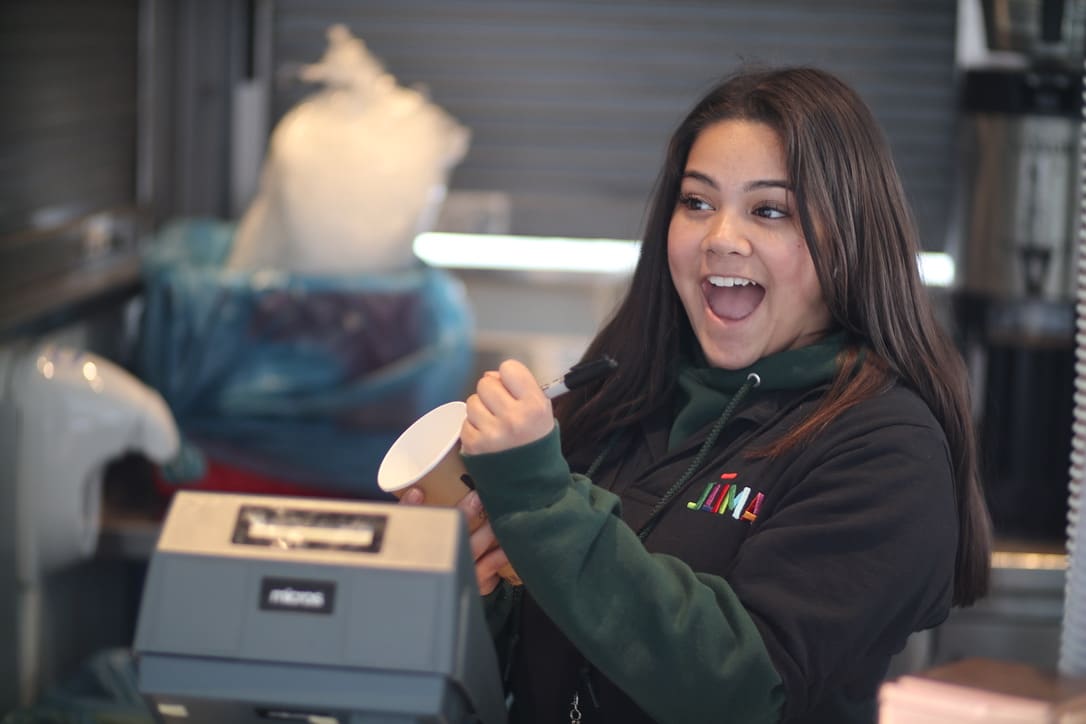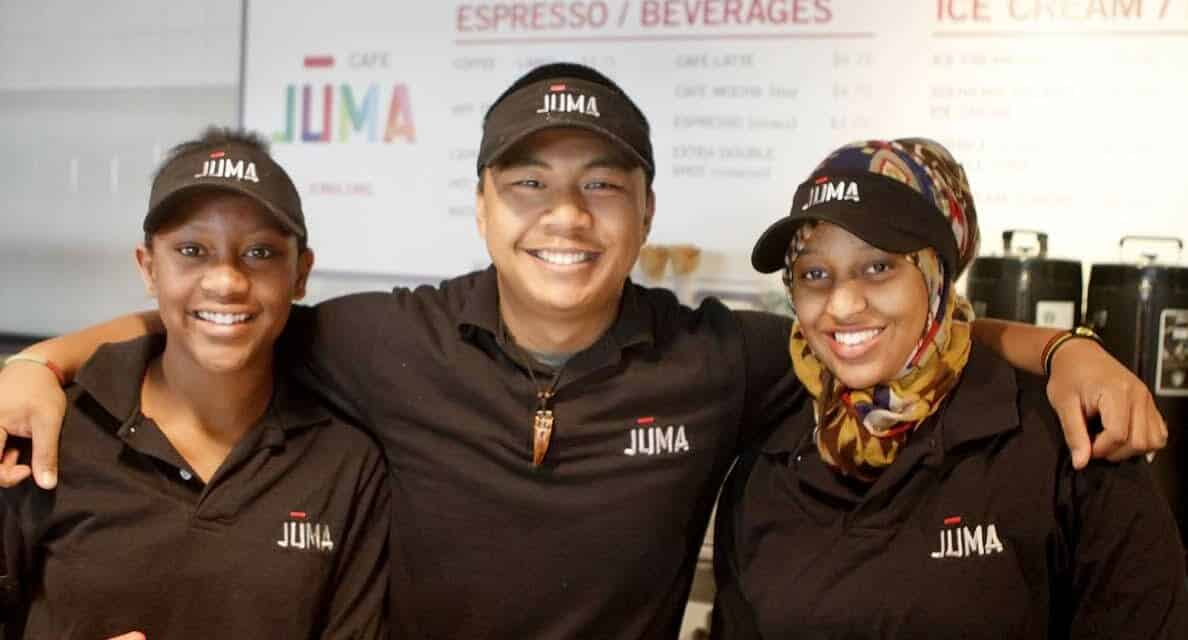TAKING A STAND: For the last 10 years, concessionaire Sodexo Live! has teamed with Juma Ventures to give marginalized young hospitality experience at T-Mobile Park in Seattle. (Courtesy Sodexo Live!)
Essence Cassell was on the move during a sold-out ballgame between the Seattle Mariners and Los Angeles Dodgers at T-Mobile Park in Seattle. Small in size, she loomed large over the coffee carts and concession stands staffed by 30 Juma Ventures youth workers.
Offering instruction and encouragement with equal zest, Cassell cares about their success because 10 years ago, she was on their side of the counter.
“What I’ve learned is that if I put my mind into it, I can accomplish anything,” said Cassell, the Seattle enterprise manager for Juma Venutres, a nonprofit social enterprise founded to help disadvantaged youth succeed.
For 10 years, Sodexo Live! and the Seattle Mariners have partnered with Juma Ventures to provide marginalized youth real-world experience in the hospitality industry as a central piece of the workforce at T-Mobile Park.
Cassell was part of the inaugural class in 2013. She was 16 at the time and learned about the program at a community center near her home. Their proposition had appeal: work at a professional sports venue, earn a paycheck, learn career and life skills and access resources to help transition to college and a career.
“I always wanted to work,” said Cassell, who started selling in-seat churros and hot dogs and was quickly given more responsibility. “I fell in love with the program. They supported me…And now I’m promoting the youth. For many this is their first job. Everyday I’m striving to give them the opportunities and encouragement they need.”
“Being able to introduce them to the workforce, to establish a strong work ethic, and arm them with transferable life skills at an influential age could open them up to new opportunities and alter the trajectory of their future careers,” said Meagan Murray, Sodexo Live! district manager.
“This has been a special partnership with the Mariners and Sodexo,” said Mason Moore, a native of the region and founding director of Seattle Juma Ventures. “They understand what’s a stake here. Yes, we have a job to do serving the guests at T-Mobile, but we also have a job as a community to serve young people, especially those that are most vulnerable and at risk of being disconnected from work and education.”
Since their first Mariners baseball season in 2013, Juma youth have worked 100,000 hours and earned more than $2.2 million in wages. This year, 115 young professionals have earned more than $162,000. On an average gameday, Juma workers staff coffee carts and concession stand serving thousands of fans while gaining valuable work skills and customer service experience.
Mercine Panganiban, 19, has been in the program since she was in high school. Now in her second year at the University of Washington, Panganiban said even though she hasn’t settled on a major, Juma has already provided important career skills.
“I have gained more confidence talking to customers,” she said, after pouring a drink for a fan on the Club level. “My communication has improved a lot. You can’t avoid dealing with rude customers, but having patience to deal with them calmly, learning that from the program, has helped a lot.”
In addition to providing job opportunities, Juma Ventures offers personalized mentorship support, financial literacy and life skills and job-readiness workshops for its workforce. Young people can learn everything from balancing a budget to creating a resume. For young people who have dealt with food insecurity and homelessness, forming trusting relationships with their peers and Juma’s adult staff provides lifelong benefits.
“We were looking at the needs of young people,” said Moore, explaining the benefits of working in sports facilities. “And many of them wanted flexible scheduling, They wanted to work shorter shifts, nights and weekends preferred, because a lot of them were wanting to go back to school during the day. What our youth like about it is that it’s a very fun, charged environment when you have a stadium packed with fans all cheering for a team.”
“It helps a lot,” Panganiban said. “They are flexible. They let you decide how much you want to work, how little you want to work, which is important to high school and college students.”
Fans support Juma by making purchases at any of their coffee locations in T-Mobile Park located on the main concourse, the Club level as well as the Rolling Roof stand, which is also operated by Juma Ventures.
“The food and beverage piece is such a great centerpiece for training those critical soft skills,” offered Moore. “How to work together as a team, how to problem solve. And how to learn and refine your customer service skills.”
“Without our people, we can’t provide guests with the top-notch hospitality they expect,” Murray offered. “We’re always looking for the best talent and we look to support team members by providing opportunities to receive mentorship, learn new skills and grow. The more we invest in the next generation, the better we can all adapt and excel together, which ultimately reflects back to our guests in their hospitality experience.”
High-performing workers also have the opportunity to move into leadership roles, first managing a single coffee cart and then multiple carts growing confidence and skills.

San Francisco-based, Juma Ventures was founded in 1993 to help youth experiencing homelessness get back on their feet. The program focuses on low-income youth ages 16-24, who are at risk of disconnection from school and work. Many of the participants grew up in poverty, have a history with foster care or juvenile justice and have experienced significant trauma. As a result, they face a multitude of barriers to employment that the program hopes to help them overcome.
Juma launched its first social enterprise in 1993: a single Ben & Jerry’s ice cream shop in San Francisco, which gave homeless youth the job experience they needed to transition from living on the streets to a stable adulthood. Today, Juma owns more than 20 social enterprise operations and employs 600 low-income youth per year in sports and entertainment venues across four cities —Sacramento, San Francisco, San Jose and Seattle.
Juma Ventures in Seattle also works with Lumen Field, the University of Washington and Climate Pledge Arena. With T-Mobile Park, with its proximity to downtown Seattle, a socially conscious hospitality partner and available access to public transportation made it a good fit, according to Moore, who started with Juma in 2012. Over the past 10 years, more than 1,000 youth have come through the Juma program in Seattle, gaining their first real-world job experience working in hospitality.
Juma Ventures is a nonprofit and donations from Sodexo per event provides enough revenue to pay youth wages, management and training. The workers also have the potential to earn pooled tips. “It’s a great model for us because we’re able to secure those donations and then invest back into the program and back into the youth,” Moore said.
“Working in hospitality builds valuable skills in so many areas – finance, time management, interpersonal, problem solving and more,” Murray explained. “With Juma, we’re excited to work with the youth no matter what path they want to take in the future. We value their time, hard work and positive energy, and we hope to help them learn skills that they can transfer to any career path. It’s been an amazing 10 years of partnership. I hope that we can help the youth build a foundation for success through their work here at T-Mobile Park.”
A Seattle Juma youth and now a program success story, Cassell said, “If I didn’t have Juma motivating me in those early years, my growing stages, I wouldn’t be where I am today. So I know how important it is.”







